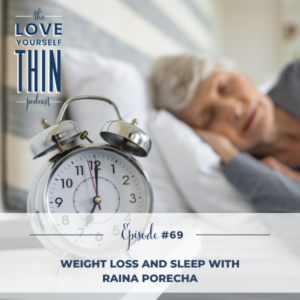
Do you ever struggle to get a good night’s rest? Or do you find yourself waking up often in the middle of the night?
Today’s episode features sleep specialist Raina Porecha. Raina became a certified Life Coach after she conquered her battles with insomnia and anxiety and now helps others do the same. Together we’re going to be diving into sleep myths, sleep and weight, and ways to overcome sleep struggles. Let’s get started!
If you are ready to lose weight and change the way you think about hunger, sign up for the lifetime access membership for Love Yourself Thin! Doors are open and you can find all the information by clicking here.
What You’ll Learn from this Episode:
- Raina’s sleep journey and how she helps others
- What the top sleep myths are
- How sleep affects our weight
- What to do when you’re struggling with sleep
- Advice for nurturers and caretakers who are struggling with sleep
Listen to the Full Episode:
Featured on the Show:
- If you are ready to lose weight and change the way you think, sign up for the lifetime access membership for Love Yourself Thin! Doors are open and you can find all the information by clicking here.
Full Episode Transcript:
69. Weight Loss and Sleep with Raina Porecha
Dara: Do you struggle with getting a good night’s rest? You may be able to fall asleep, but you wake up at 2: 30 every single night or you’re tossing and turning, you can’t get to sleep, and you just think there’s no way you can ever have a good night’s rest. Well, this podcast episode is for you. I’m Dara Tomasson and this is Love Yourself Thin episode 69, Weight Loss and Sleep with sleep specialist, Raina.
Before we go to the interview, I just wanted to share with you that sleep is one of the main issues that I see keeping women from losing weight. I have done a lot of my own sleep work and I have helped so many of my clients with it, and I thought it would be really helpful on the podcast to bring in a sleep specialist and you will learn so much from her. And one of the things that was really fun for me as I interviewed her, was just how much love yourself thin has the solution for sleep. And it was just so wonderful to hear Raina talk about her experiences and how she’s been able to help people, and it just makes me love my tools that I teach so much more. Raina I cannot wait for you to enjoy this podcast, and I want to hear back from you what your main takeaways were. All right. Now we’re gonna listen to the interview with Raina, a sleep specialist.
Hello and welcome to my interview with Raina Porecha. She is a sleep coach and I know so many of us struggle with sleep, I include myself. I’ve done so much work on my own sleep, and I heard about Raina and I had to get her onto this podcast because we can actually have a good night’s rest. And so Raina is the expert and so welcome, Raina. Tell us a little bit about yourself.
Raina: Thank you. I’m so excited to be here. So I am certified through the Life Coach School and the Sleep Coach school. I became an insomnia, anxiety coach in 2021, and the reason I came to that niche was due to my own struggles with insomnia, which started in 2015 after the death of a loved one. And then I had several very stressful life events that occurred over the next five years, including the end of a very long term relationship, I moved several times, changed jobs several times, got into work that was much more demanding than I had been doing, and I had some different family crises that occurred during that period.
So it became very, very difficult to get a good night of sleep. Most nights I’d have no trouble falling asleep, but I’d wake up at 2, 2: 30, almost exactly on the dot each and every night, including Saturdays and Sundays. And I was working full time, and once I would wake up at two or 3: 30, I would just agonize over when I’d fall back asleep, how much sleep I was gonna get. Needed to be at work by eight, and maybe I would fall back asleep around 5:30, wake up at 6:30, 6:45, and then get up, be out of the door to work. And that’s how I lived for five years.
And then people ask, Well, how did you do that? How did you survive on such little sleep? Well, sometimes I’d have to catch naps in my car. Sometimes I’d have to cancel all my plans on weekends just in case sleep overcame me and I needed to take a nap. So it really, really affected my quality of life. So I know what a lot of people out there are going through because I’ve lived through it myself and recovered. So I’m here to shepherd people through the same journey that I took.
Dara: That is so amazing. So I was hoping for Raina if you could touch on the top myths of sleep, like even the top three and just kinda share with us what power do we have? Because I’m sure, especially during that five years, you really did feel, and you were, you were a victim to sleep, it felt really unempowering. So love for you to share.
Raina: Sure. I think some of the big myths are that it’s intrinsic and that you can’t do anything about it. That is a huge myth. It is not purely physical. There are definitely things you can do with your mindset to help increase the hours and quality of sleep that you’re getting. So that’s number one. A lot of people think there’s nothing you can do. There’s a lot you can do.
The second thing I would say is a big myth is that sleep affects everything in your life. So during the five years I was struggling, I was in the grip of insomnia, I got a raise, I got a promotion, I was one of the most productive members on my team at work, I was traveling all over the country. But the entire time I was terrified that I was gonna get fired, that I wasn’t performing well, that I was doing the worst that I had ever done. And then once I had come out of really the depths of insomnia and I did an objective inventory of what I actually had achieved during that time period. It was the most that I had done in my life.
So there’s a big myth that insomnia is going to really erode the quality of your life. And actually I’m not saying there’s a 0% correlation, but it’s flexible. It’s not as big of a correlation as you think, and it’s not static. So you definitely feel miserable. You are physically suffering, you are emotionally suffering. But there is a part of you that is still getting day to day things done. I think that’s because a lot of people who suffer from insomnia can be Type A personalities. They wanna get a lot done, so they continue to get a lot done, even though they’re exhausted, that is not a great cycle to be in. But they’re consistently telling themselves, their inner dialogue is I’m not getting enough done. But in fact, the opposite is true. So that’s another myth, that it affects every aspect of your life and you’re really dragging and not performing well. Objectively that can be very untrue if you actually sit down and write out the things you’re actually doing, although you are super tired.
Dara: Yeah, that’s, that’s so good.
Raina: Yeah. Number three is that you can just do sleep hygiene. You can do, you can focus on actions to try to recover rest, and that really, is a prevailing messaging out there when you go to different blogs or you’re listening to How to Get Better Sleep, even on popular daytime shows. And that is always the advice. Make sure your room doesn’t have any light. Make sure that you have enough melatonin or supplements that you like to take, avoid being on your device two hours before bed. All of those things are good. But there’s some deeper mindset issues at play that are really standing in the way of getting more rest, and that goes unaddressed by the prevailing advice surrounding sleep and insomnia these days.
Dara: Yeah, it’s kinda like with diets, right? People they’re telling you what to do and, but really if you don’t have the mindset on par, then it won’t make a difference.
Raina: Exactly. You’re exactly right.
Dara: Yeah. So what is someone to do when they do struggle? Like they have a hard time going to sleep, or they, like they can go to sleep okay but they wake up at like 2:30 or three o’clock. So what, what advice do you have for people in that situation.
Raina: Okay, so I’m gonna give some very broad advice, and a lot of people may balk at this because they’re like, okay, if I could do that, I would, and this is exactly what I help people with and clients with. When you wake up, take inventory of the first thing you’re thinking. Is it, oh no, what time is it? When am I gonna go back to sleep? All of those things induce panic. So my broader statement is, let’s get control of the panic, stop panicking. And what I mean by that is if the first thoughts that go through your mind are panic inducing, you feel fear, you start to look at your watch, you begin to do sleep math.
Sleep math is when you wake up in the middle of the night and then think, If I can only fall asleep in a half hour, then I’ll at least get two or three hours more before I need to wake up. All of that inner dialogue is not helping your mind to relax. It’s putting it in a state of fight or flight. And that is not going to help you get back to sleep.
So that is the main thing our brains wanna do. Totally normal. I did that every night for five years, wake up, immediately think, what do I do? What do I do right now? And it felt like the most natural thing was look at the clock. Okay, look at the clock. Then in order to avoid my panic and not feel it, then I’d start doing sleep math because, well, I don’t wanna feel the panic, so I want to be rational, So what makes the most sense? Well, okay, if I go back to sleep in half hour, As if I’m a machine treating myself, like I’m some type of machine that I can just flip on and off. If I go back to sleep in a half hour, then I’ll get three hours of sleep and then I’ll be okay. I’ll still have a hard day, but I’ll be okay. Well, what did that end up doing?
That ended up just ignoring my emotions in the moment, which were fearful, anxious, panicky, and I didn’t take any time to sit and process that emotion even in the middle of the night because my whole idea to fix that middle of the night wake up problem was to just skip over the panic and let’s get to the solution. And the result that that brought was more sleeplessness.
So, yeah, I know what I just said is gonna be hard to put in practice. That’s exactly what I work on with clients when we’re together, is how do we stop that panic in the moment? How do we use our prefrontal cortex to gain control in that moment? And really step away from the edge where we think, okay, we’re jittery, we’re nervous, we wanna figure out a solution right away. How do we sit with the anxiety in that moment and just let it flow through so that way once that jittery energy is out, we have more space for more restful energy to make itself present. Our body knows what to do, but when we try to interfere in those moments, we just end up perpetuating the sleepless.
Dara: Yeah, then that’s the work of course, since we go to the same life coach school, we have the same tools and it’s exactly the, the same kind of process that I walk my clients through. So at the beginning, we were just pre chatting beforehand, you asked two really good questions and they were, how doesn’t sleep affect your life? And how isn’t my weight loss attached to sleep? So I wonder if you could just touch on that because, anecdotally, and there is, there is quite a bit of research about how sleep does affect our weight so I’m just wondering if you can just touch on that.
Raina: Yeah. I think sleep does affect weight. There are scientific studies to support that. I think where the problem occurs is thinking that if I don’t sleep, there’s nothing I can do about my weight. It’s only thinking from the negative perspective of I don’t sleep well, so it’s gonna be hard for me to lose weight. Well, sleep is just one aspect of it. There’s also drinking enough water. There’s also choosing the right foods, eating to a comfortably full but not excessively full point. So yes, being fatigued makes all of those things tougher, but not impossible. Sleeping well does enhance your weight loss, but it’s not the sole, it’s not solely responsible for your weight loss.
Divorcing yourself from an all or nothing perspective where you’re thinking, I don’t sleep well, therefore I can’t lose weight. That really is a disempowering place to be. So I’m not denying that sleep has an impact on weight loss, but to what degree for each individual person? We don’t know. We can’t really narrow that down to an exact percentage and say, well, for you, you’re not sleeping well and I can tell you that’s 55% of the issue as to why you can’t lose that last five pounds. We don’t have that much visibility into how much it affects your weight loss. We know it does, but if we don’t know that for any specific individual, it’s not something we should really put an over emphasis on. We should be conscious of it but that doesn’t mean throw out all the other nice things that you’re doing to support your weight loss.
Dara: Yeah, that’s such good advice. So one of the things that I notice that is a real struggle is when we and a lot of us are caretakers I definitely am a big nurturer. It’s like part of who I am. I have five kids and I come from a big family. It’s just natural for me to think about other people. And so if you could just talk a little bit about how how difficult it is for caretakers moms, even non moms, people who, you know, they bring, like work home with them and then they’ve just been thinking about it. So that definitely affects our sleep. So is there some help or support that you can give around that?
Raina: Yeah, I think people who are naturally nurturing and who are caretakers, because they could get a lot of good feelings from engaging in that type of behaviors with their loved ones or their passions, whether it’s their workplace or hobbies or volunteer groups or community groups. They can double down on that, even when their gas tank is empty. So they feel like, okay, I’m tired, but I know that every time I volunteer or every time I take care of my child or do something for a loved one, I usually feel good. And they lose track of when it stops feeling good, and then they keep trying to act in nurturing ways to get that feeling again.
So, I think what’s clear is start paying attention when the nurturing and care taking doesn’t seem to deliver the desired effects anymore, that’s when you know that you’re tired. And that nurturing and that care needs to be directed toward yourself.
So it’s not to say you should stop doing it, at all. I’m not saying that you should stop and throw it out all together. But there’s a tipping point after which it becomes the payoff isn’t exactly what you’re expecting, even though you keep continue to double down. Well, only if I do this, maybe if I make the cookies for the bake sale, or maybe if I visit this neighbor in the hospital and make sure I bring flowers, or maybe if I figure out what’s bothering my daughter and help her with this problem and I stay up at.
And I feel, I’m hoping I feel good. So let, let’s notice if there’s a payoff in the nurturing. And if it’s not done from a place of where you’re noticing you’re not feeling good and you continue to double down on that action, that’s when you know maybe it’s time to reserve that energy to recharge.
Dara: Yeah. And when I hear you saying that it’s such a, like I talk about plateauing, like when I’m this, then I’ll feel happy, which of course always brings us to conditional love. And a lot of us have been raised that way of thinking, you know, your worth, you have to, you have to do things to earn your worth or to, to, to deserve something or to earn it. And that is a very conditional way of living. And so, of course, it does tend to empty you and exhaust you because it’s like the moving target. Like, that’s not how it works. Like our worth is already set and so we don’t have to achieve that.
And so I see that with my clients thinking that you have to weigh a certain amount before you can be deemed worthy or wonderful or whatever that is. And so, And it just gives we call it like you know, you’re just on this the hamster on the wheel. It’s like you’ll never get to your destination. It’s this never ending cycle and it’s not gonna get you what you really want.
Raina: Yeah, exactly. And I think it’s the same with a lot of people who like to nurture. They continue to add items of care taking to their to-do list, and they feel like if I get to the bottom of the to-do list, if I write all the thank you notes, if I make all the pies, if I attend all the events, if I make all the phone calls to check in, and if I help X, Y, and Z with A, B, and C problems, if I get to the bottom of the list, then I feel good, then I get to rest.
Dara: Yes. Yes.
Raina: And so it’s hustling also to deserve, because maybe you think the only thing you have to give is nurturing. And that you better give all of it all the time. So that is just something to pay attention to. It’s not to diminish, you know, a lot of women feel like they have to nurture, but they like to do it too. So it’s not to diminish that part of you that likes to. It’s to just be aware of that subtle shift when it feels like you’re doing it to bolster your self worth. And you feel exhausted, then you know it’s not, if it doesn’t fill you up and lift you up and make you feel great, then, you know, you’re trying to get something out of it that it’s not gonna deliver for you.
Dara: Yeah. And I think you, I think that was a really good way of describing it too, of like hustling. It’s like you have to, it’s like that panicky, like you have to do it. It’s similar to when people are going to a wedding and they wanna lose that weight for the wedding or the Christmas pictures or whatever, and it just feels like really frantic, like, If I don’t do this I won’t feel, I won’t be this way, I won’t be successful, or whatever that is.
So this has been so, so amazing. I have loved spending this time with you. I have taken like so many pages of notes and so I will have a handout with information that people can, you can print off when you listen to this podcast. And I will also have Raina’s information. So Raina tell us how people can get ahold of you.
Raina: So you can reach me at rainaporecha.com and I will give you that link so you can put it in your show notes. And people can book a consultation with me. We can talk about any of the sleep issues you’re challenged with, and if you’re wondering about who I help. I help all kinds of parents of any different age, children. I help women going through menopause. I help men who are very stressed with different life challenges or pressures at work. So mainly I work with women, but because I understand that there are a lot of pressures, unique pressures women are facing that really, really interfere with their sleep even more than biological issues.
Dara: Yeah, and I think that that’s, there’s a lot of misunderstanding about how much our thoughts impact our bodies. And so I can see how so many people and myself included, we can read these books on sleep or weight loss or whatever it is, and we can think, Okay, I know the things I’m supposed to do, but just like you and I help, we help everyone understand that our thoughts really are the key to being successful. And I know that someone who specializes in sleep, like what you’re doing is just so needed and I really appreciate the time that you spent with us.
Raina: Yeah, you’re very welcome. And the final thing I just wanted to say is fixing this is easy it’s just seeing the patterns that’s hard. And that’s what a coach helps you do. They just point the patterns out. Once you see it, you will know the rest.
Dara: Oh my gosh. I love that so much. All right, Raina, this has been so good. Thank you so much for spending this time with us.
Raina: You’re very welcome. Thank you








